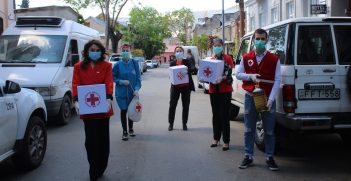COVID-19 Pandemic: A Wake-Up Call for African Leaders

For several decades, African countries have relied on foreign support to fix local problems. As high-income countries grapple with the pandemic at home, African leaders must find a way to help themselves.
The COVID-19 pandemic is one of the biggest threats that the world has faced since the end of the second world war, causing widespread social, economic, and political challenges. With cases of infections now over one million and fatalities in the tens of thousands, and the resulting economic meltdown, country-wide shutdowns, and long-term uncertainties, the pandemic is likely to have severe consequences.
While the pandemic is already stretching healthcare facilities in “developed” countries such as Italy, Spain, France, the United States, and the United Kingdom, the World Health Organization (WHO) fears the areas with the most vulnerability are low-income countries, especially those in Africa where a “third wave” of the pandemic is envisaged after China and Europe.
One key lesson African countries will hopefully learn from this pandemic is that the “big brother” will not always be around to help, as has been the case in previous disasters. Ranging from managing clandestine migration across African states towards the Mediterranean to the eradication of polio, several African states have built a seemingly total dependence on external support to tackle almost every form of domestic challenge. This has impacted their ability/willingness to address their issues themselves.
Although it might be necessary to seek foreign intervention when a state is unable to protect its citizens, it is imperative to point out that many African countries are simply unwilling to take responsibility when problems arise. Instead, they often shift the burden to either former colonial powers or any foreign nation willing to donate funds as part of their humanitarian aid initiatives.
State of healthcare in Africa
The state of healthcare in many African countries is disturbing. Most countries in Africa would not be able to combat a global pandemic without foreign assistance. In 2018, WHO carried out an analysis of the status of health, health services, and health systems in Africa in the context of the Sustainable Development Goals. The report stated that all African countries fall below the required indexes for healthcare provisions, with Algeria being the only country able to provide the required levels of healthcare for about 70 percent of its citizens.
In terms of access to healthcare, only three countries (Mauritius, Sao Tome and Principe, and Seychelles) can reach a 50 percent threshold. In Nigeria for instance, the University College Hospital Ibadan, an institution which was ranked as the fourth best hospital in the commonwealth 20 years ago, is struggling to provide basic healthcare due to erratic power supply.
Are African countries unwilling or unable to protect their citizens?
There are three main explanations for the lack of adequate healthcare in African countries. The top issue is corruption. The high position of several African countries on the corruption perception index (CPI) indicates that several African countries tilt more toward unwillingness rather than inability to protect their citizens. The 2019 CPI shows that Africa is the worst performing region in the world, with an average regional score of 32 (1 being highly corrupt and 100 being least corrupt).
The cases of Nigeria and South Africa, the two biggest economies on the continent, are worth exploring. Nigeria has a CPI score of 26, and South Africa scores 44. The healthcare system in Nigeria is inadequate, with the country equipped with less than 500 ventilators nationwide to fight COVID-19. Corruption plays a significant role in the lack of adequate healthcare in the country. A recent publication by Carnegie Endowment for International Peace laid bare the level of corruption in Nigeria. It identified about 800 properties in the United Arab Emirates, estimated to be worth over 146 billion naira ($400 million), linked to Nigerian politically exposed persons and mostly purchased with stolen government funds.
While South Africa has better equipped hospitals than Nigeria, widespread corruption in the country, and particularly in the health sector, has greatly impacted health provisions in the country. Despite health care being the third largest item of government expenditure in South Africa, issues such as fraudulent orders and tender irregularities have impacted the ability of the sector to provide adequate care to citizens. This prompted President Cyril Ramaphosa to launch an initiative to root out corruption in the sector in 2019.
A second issue is outbound health tourism, which has reduced the incentive to develop African hospitals. It is estimated that Africans spend about $1 billion annually on medical tourism to Asia and the middle East. Many Africa politicians including presidents have themselves engaged in health tourism abroad, further reducing the incentives to develop healthcare at home.
A third issue is widespread poverty. Some African countries are simply unable to protect their citizens due to lack of resources. The 2018-2019 Ebola epidemic in West Africa resulted in more than 28,600 infections and 11,000 deaths. Concerted effort from multiple foreign countries, mostly outside of Africa, was needed to combat the epidemic and produce a vaccine. The Ebola outbreak resulted in improved infection control, humanitarian logistics, and disease surveillance capabilities especially in the countries most affected (Guinea, Liberia, and Sierra Leone). For instance, Guinea has increased spending on healthcare and recruited 2,950 additional health care workers. In spite of this, most of the other African countries lack the capacity to combat a major epidemic.
A wake-up call?
Unlike previous health, economic, and security threats faced by African countries where foreign powers were quick to intervene, the COVID-19 pandemic is different. This is because the “big brothers” (Europe and America) are also battling the pandemic themselves. The number of infections and casualties in these countries currently outnumber those in Africa and it is logical to expect these countries to focus on the health of their citizens before assisting African countries.
If “advanced” Western countries are struggling to curtail the spread of the virus, many African countries will undoubtedly struggle to do the same. Since there are no “big brothers” to run to as in the case of the Ebola epidemic, African countries need to look inwards and take drastic steps to address these challenges, develop their healthcare sectors, and discourage health tourism abroad.
Dr Olayinka Ajala holds a doctorate degree in Politics from the University of York and a Masters degree in Globalisation and Development from the Institute of Development Studies, University of Sussex. In 2014, Olayinka was a visiting fellow/lecturer at the Combating Terrorism Centre, United States Military Academy, West Point. He also consults for local and international organisations including the European Union and Ministry of Defence, UK.
This article is published under a Creative Commons License and may be republished with attribution.




